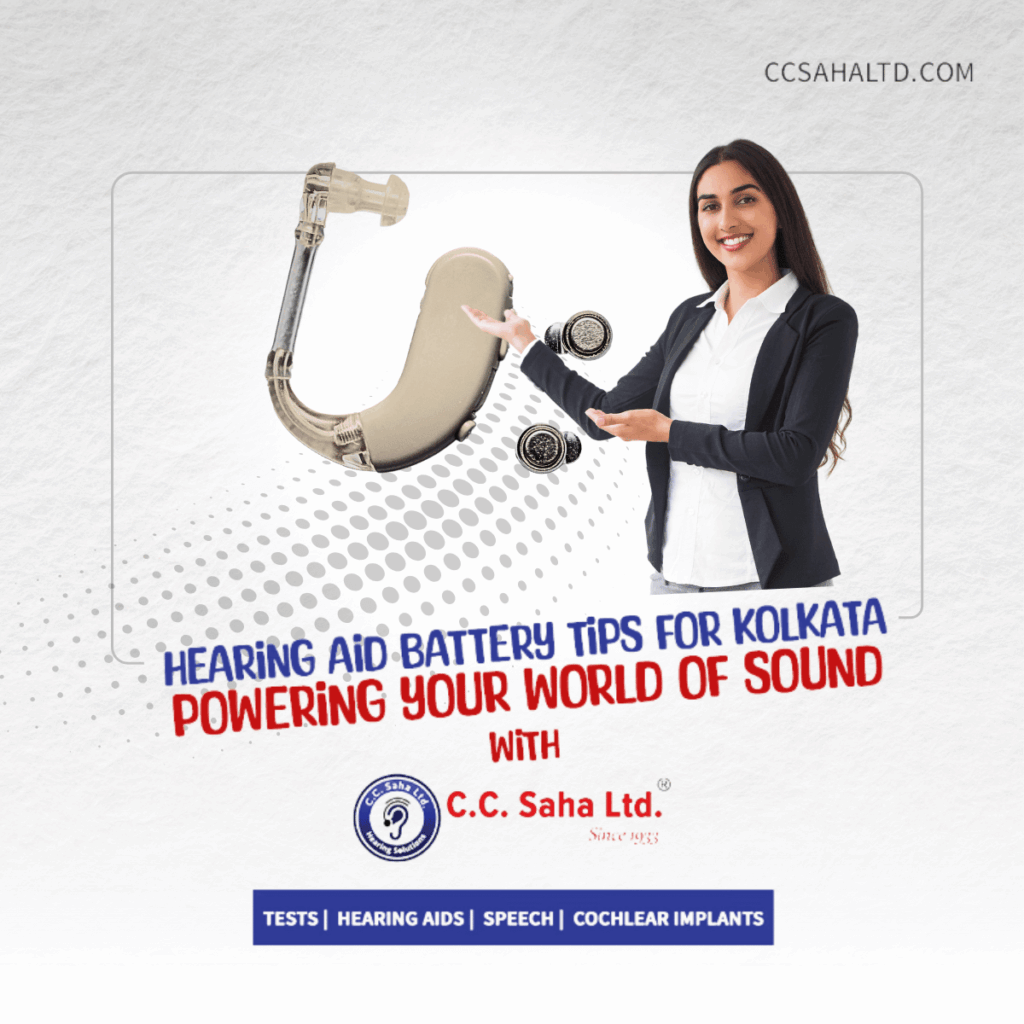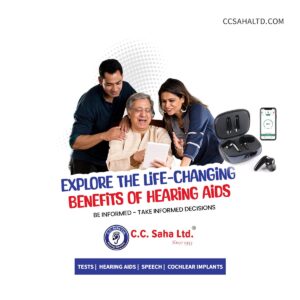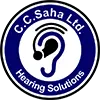
Paediatric Hearing Care
Early intervention is the key to paediatric hearing care. Learn how CC Saha Ltd. combines audiology, speech therapy, and occupational therapy for success.
For generations, CC Saha Ltd. has been a trusted name in Kolkata, dedicated to enhancing the quality of life through better hearing. We understand that your hearing aids are your lifeline to the vibrant sounds of our beloved city – from the morning prayers to the bustling markets and the joyful chatter of family. A crucial aspect of ensuring your hearing aids perform optimally is proper battery care and charging. This comprehensive guide on hearing aid battery tips for Kolkata is designed specifically for our valued users in Kolkata, including our respected senior citizens and the caring parents of young hearing aid users.
The unique climate of Kolkata, with its characteristic humidity, can present specific challenges for hearing aid batteries. Understanding the nuances of battery types, whether disposable or rechargeable, can significantly extend their life and the performance of your devices. Let’s delve into the best practices that will keep your hearing aids powered up and you connected to the world. At CC Saha Ltd., we believe in empowering you with knowledge, and these hearing aid battery tips for Kolkata are a testament to that commitment.

Before we jump into the tips, it’s helpful to understand the two main types of batteries your hearing aids might use:
Knowing which type powers your device is the first step in our hearing aid battery tips Kolkata journey.
If your hearing aids use disposable zinc-air batteries, these practices will help you get the most out of each cell. Proper care ensures not just longevity but also consistent performance, which is crucial for clear hearing in diverse environments, from quiet homes to noisy Kolkata streets.
These essential Kolkata hearing aid battery tips for longevity will ensure your disposable batteries serve you well.
Rechargeable hearing aids offer incredible convenience, but they too benefit from good charging habits. Here’s how to ensure your rechargeable hearing aids remain reliable.
Adhering to these hearing aid battery tips for Kolkata for rechargeable devices will maximize their lifespan and daily reliability.
Beyond specific battery management, how you care for your hearing aids in general significantly impacts battery consumption and longevity. This is especially true in Kolkata’s climate.
What are the two main types of hearing aid batteries?
The two main types are Zinc-Air Disposable Batteries and Rechargeable Batteries (usually Lithium-ion).
How do I know which size of disposable battery my hearing aid uses?
Zinc-air disposable batteries are color-coded for easy identification: Size 10 (Yellow), Size 312 (Brown), Size 13 (Orange), and Size 675 (Blue).
How do Zinc-Air batteries work?
They are air-activated; removing a small factory-sealed sticker allows oxygen to enter and activate the battery.
What’s the “5-Minute Rule” for disposable batteries?
After removing the protective tab from a new zinc-air battery, wait for 5-7 minutes before inserting it into your hearing aid. This allows the battery to fully absorb oxygen and activate, extending its lifespan.
How should I store unopened hearing aid batteries?
Store unopened battery packs at normal room temperature (ideally 20-25°C) in their original packaging, in a dry place. Avoid extreme temperatures or loose storage with metal objects.
Why should I open the battery door of my hearing aid when not in use?
Opening the battery compartment when not in use (especially overnight) minimizes battery drain and, crucially for Kolkata’s climate, allows any accumulated moisture inside the hearing aid to evaporate, protecting both the battery and internal components.
Is it safe to carry loose batteries in my pocket or purse?
No, avoid loose storage as they might come into contact with metal objects like coins or keys, which can cause them to short-circuit. Always keep them in their original packaging.
How should I dispose of used hearing aid batteries?
Used hearing aid batteries should be disposed of responsibly. Check with CC Saha Ltd. or local Kolkata municipal waste guidelines for proper recycling or disposal points. Never burn batteries.
How often should I charge my rechargeable hearing aids?
It’s recommended to charge your rechargeable hearing aids every night, just like your smartphone, to ensure you start each day with a full charge.
Can I use any charger for my rechargeable hearing aids?
No, always use the specific charger that came with your hearing aids or one recommended by CC Saha Ltd. Using an incompatible charger can damage the batteries or the hearing aids themselves.
Do I need to fully discharge my rechargeable hearing aids before charging them?
No, modern lithium-ion batteries in rechargeable hearing aids do not suffer from the “memory effect.” Topping them up is perfectly fine; you don’t need to fully discharge them before recharging.
What should I do if my rechargeable hearing aids don’t seem to be charging?
First, ensure the charger is plugged in and the power outlet is working. Check that the hearing aids are correctly seated in the charger and clean the charging contacts. If problems persist, bring them to CC Saha Ltd.
How does Kolkata’s humidity affect hearing aid batteries and devices?
Kolkata’s high humidity can significantly impact hearing aids and batteries. Moisture can cause damage and reduce battery life. Using a hearing aid dehumidifier or drying kit nightly is crucial.
Why is regular professional servicing important for battery life?
Regular check-ups and professional cleaning at CC Saha Ltd. can identify potential issues causing excessive battery drain. Clean hearing aids also work more efficiently, reducing power consumption.
Where can I get reliable hearing aid batteries and support in Kolkata?
CC Saha Ltd. is a trusted name in Kolkata, offering expert guidance, genuine fresh batteries, authentic charging accessories, and comprehensive audiology support tailored to the local environment.

Early intervention is the key to paediatric hearing care. Learn how CC Saha Ltd. combines audiology, speech therapy, and occupational therapy for success.

As we welcome 2026, it is time to prioritize ear health. Explore our guide on making impactful hearing resolutions for the New Year, from annual testing to upgrading your devices.

At CC Saha Ltd., excellence in hearing care meets a legacy of compassion and expertise. As the best hearing aid centre in Kolkata since 1933, the brand continues to make hearing comfortable, easy, and life-changing for every generation.

CC Saha Ltd delivers the best cochlear implants in Kolkata and Eastern India, specializing in various types and guiding patients through every stage of the cochlear implant journey.

Early detection of hearing loss can define a child’s ability to communicate, learn, and connect with the world. Paediatric hearing tests are designed to identify hearing challenges at the earliest stages, often before a parent even notices a concern. From new-born OAE and ABR screenings to playful conditioned audiometry in toddlers, these specialized tests ensure accurate results in a child-friendly way.

The benefits of hearing aids go far beyond better hearing—they transform lives by improving communication, emotional health, and cognitive vitality. From reconnecting with loved ones to regaining confidence in social and professional settings, hearing aids restore the joy of sound in every moment. With advanced technology that adapts to individual environments, they offer clarity, comfort, and control. Discover how embracing modern hearing solutions through CC Saha Ltd. can help you experience the life-changing benefits of hearing aids today.

